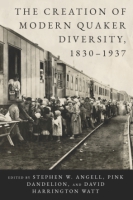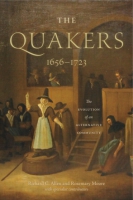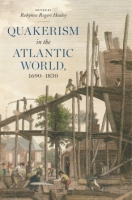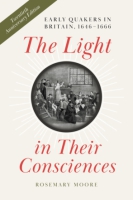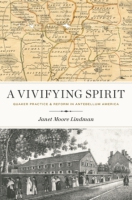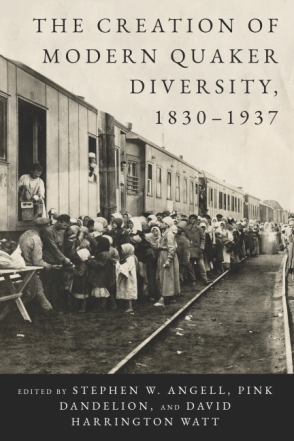
The Creation of Modern Quaker Diversity, 1830–1937
Edited by Stephen W. Angell, Pink Dandelion, and David Harrington Watt
The Creation of Modern Quaker Diversity, 1830–1937
Edited by Stephen W. Angell, Pink Dandelion, and David Harrington Watt
“This volume and series deserve to attract readers from inside and outside the denomination who will embrace this collection as an intrinsically diverse replacement for single-author magisterial histories.”
- Description
- Reviews
- Bio
- Table of Contents
- Sample Chapters
- Subjects
“This volume and series deserve to attract readers from inside and outside the denomination who will embrace this collection as an intrinsically diverse replacement for single-author magisterial histories.”
“The Creation of Modern Quaker Diversity offers compelling analyses of a particularly turbulent period in Quaker history and is essential reading for anyone wishing to understand more about the origins and evolution of Quakerism as it exists in its many forms today.”
“The Creation of Modern Quaker Diversity, 1830-1937 is the authoritative assessment of global Quakerism from 1830 to 1937. It makes extensive use of multiple genres of primary sources and has left no stone unturned in finding a diverse range of voices to include. While other books have dealt with individual topics, this volume provides in one place an examination of the period.”
“This collection of essays represents the most significant scholarship on modern Quakerism produced to date. It will be the go-to source for all future students and scholars working on Quakerism during the key period of its modernization.”
Stephen W. Angell is Leatherock Professor of Quakerism at the Earlham School of Religion.
Pink Dandelion directs the work of the Centre for Research in Quaker Studies at Woodbrooke and is Professor of Quaker Studies at the University of Birmingham and a Research Fellow at Lancaster University.
David Harrington Watt is Dorothy and Douglas Steere Professor of Quaker Studies at Haverford College.
Acknowledgments
Introduction: The Remapping of Quakerism, 1830–1937
Pink Dandelion
1. Quakers and Empire
Sylvester A. Johnson and Stephen W. Angell
2. Quakers and Reform in Nineteenth-Century America: Friends’ Response to Antislavery, Women’s Rights, and the American Civil War
Julie L. Holcomb
3. The Loss of Peculiarity and the New Quaker Identity: The Outward and the Inward Life
Emma Jones Lapsansky
4. The Revival, 1860–1880
Thomas D. Hamm
5. Quakers and the Growth of the Pastoral System
Isaac Barnes May
6. Quakers and “Religious Madness”
Richard Kent Evans
7. Quakers of the Liberal Renaissance, 1870–1930: Rediscovering the Light Within
Joanna Clare Dales
8. The Delineation of Quaker Spiritualities
Carole Dale Spencer
9. Quakers and the Social Order, 1830–1937
Nicola Sleapwood and Thomas D. Hamm
10. Quakers and Missions, 1861–1937
Stephen W. Angell
11. The Peace Testimony and the Crisis of World War I
Robynne Rogers Healey
12. Quakers in Politics
Stephanie Midori Komashin and Randall L. Taylor
13. The All-Friends Conferences and Their Effects
Douglas Gwyn
Afterword: Rufus Jones and Quaker History
David Harrington Watt
Notes
Selected Bibliography
List of Contributors
Index
Download a PDF sample chapter here: Introduction
Mailing List
Subscribe to our mailing list and be notified about new titles, journals and catalogs.
